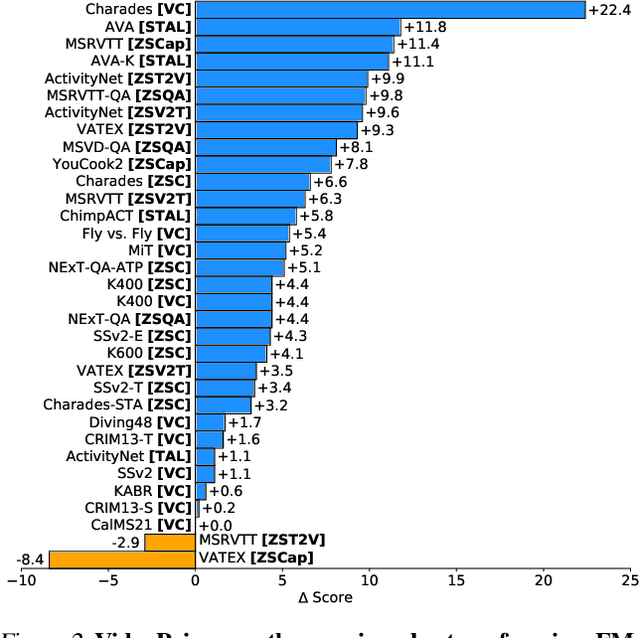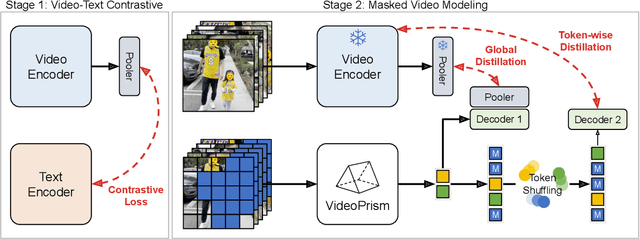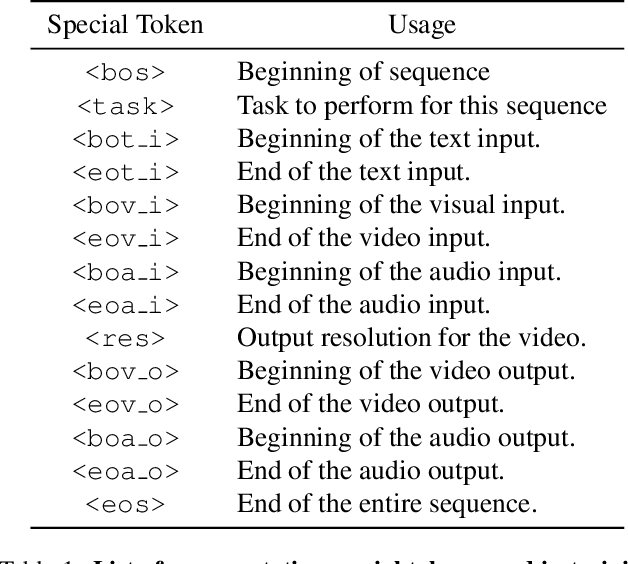Rachel Hornung
Neptune: The Long Orbit to Benchmarking Long Video Understanding
Dec 12, 2024



Abstract:This paper describes a semi-automatic pipeline to generate challenging question-answer-decoy sets for understanding long videos. Many existing video datasets and models are focused on short clips (10s-30s). While some long video datasets do exist, they can often be solved by powerful image models applied per frame (and often to very few frames) in a video, and are usually manually annotated at high cost. In order to mitigate both these problems, we propose a scalable dataset creation pipeline which leverages large models (VLMs and LLMs), to automatically generate dense, time-aligned video captions, as well as tough question answer decoy sets for video segments (up to 15 minutes in length). Our dataset Neptune covers a broad range of long video reasoning abilities and consists of a subset that emphasizes multimodal reasoning. Since existing metrics for open-ended question answering are either rule-based or may rely on proprietary models, we provide a new open source model-based metric GEM to score open-ended responses on Neptune. Benchmark evaluations reveal that most current open-source long video models perform poorly on Neptune, particularly on questions testing temporal ordering, counting and state changes. Through Neptune, we aim to spur the development of more advanced models capable of understanding long videos. The dataset is available at https://github.com/google-deepmind/neptune
VideoPrism: A Foundational Visual Encoder for Video Understanding
Feb 20, 2024



Abstract:We introduce VideoPrism, a general-purpose video encoder that tackles diverse video understanding tasks with a single frozen model. We pretrain VideoPrism on a heterogeneous corpus containing 36M high-quality video-caption pairs and 582M video clips with noisy parallel text (e.g., ASR transcripts). The pretraining approach improves upon masked autoencoding by global-local distillation of semantic video embeddings and a token shuffling scheme, enabling VideoPrism to focus primarily on the video modality while leveraging the invaluable text associated with videos. We extensively test VideoPrism on four broad groups of video understanding tasks, from web video question answering to CV for science, achieving state-of-the-art performance on 30 out of 33 video understanding benchmarks.
VideoPoet: A Large Language Model for Zero-Shot Video Generation
Dec 21, 2023



Abstract:We present VideoPoet, a language model capable of synthesizing high-quality video, with matching audio, from a large variety of conditioning signals. VideoPoet employs a decoder-only transformer architecture that processes multimodal inputs -- including images, videos, text, and audio. The training protocol follows that of Large Language Models (LLMs), consisting of two stages: pretraining and task-specific adaptation. During pretraining, VideoPoet incorporates a mixture of multimodal generative objectives within an autoregressive Transformer framework. The pretrained LLM serves as a foundation that can be adapted for a range of video generation tasks. We present empirical results demonstrating the model's state-of-the-art capabilities in zero-shot video generation, specifically highlighting VideoPoet's ability to generate high-fidelity motions. Project page: http://sites.research.google/videopoet/
Alternating Gradient Descent and Mixture-of-Experts for Integrated Multimodal Perception
May 10, 2023



Abstract:We present Integrated Multimodal Perception (IMP), a simple and scalable multimodal multi-task training and modeling approach. IMP integrates multimodal inputs including image, video, text, and audio into a single Transformer encoder with minimal modality-specific components. IMP makes use of a novel design that combines Alternating Gradient Descent (AGD) and Mixture-of-Experts (MoE) for efficient model \& task scaling. We conduct extensive empirical studies about IMP and reveal the following key insights: 1) performing gradient descent updates by alternating on diverse heterogeneous modalities, loss functions, and tasks, while also varying input resolutions, efficiently improves multimodal understanding. 2) model sparsification with MoE on a single modality-agnostic encoder substantially improves the performance, outperforming dense models that use modality-specific encoders or additional fusion layers and greatly mitigating the conflicts between modalities. IMP achieves competitive performance on a wide range of downstream tasks including image classification, video classification, image-text, and video-text retrieval. Most notably, we train a sparse IMP-MoE-L focusing on video tasks that achieves new state-of-the-art in zero-shot video classification. Our model achieves 77.0% on Kinetics-400, 76.8% on Kinetics-600, and 76.8% on Kinetics-700 zero-shot classification accuracy, improving the previous state-of-the-art by +5%, +6.7%, and +5.8%, respectively, while using only 15% of their total training computational cost.
 Add to Chrome
Add to Chrome Add to Firefox
Add to Firefox Add to Edge
Add to Edge